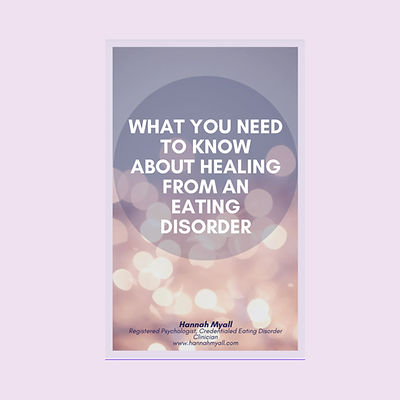Eating Disorder Treatment and Eating Disorder Therapy
There is no one right way to recover from an eating disorder and no one size fits all approach. As someone who has also struggled with an Eating Disorder , I believe that full recovery is possible, not just symptom improvement or weight restoration. I will work with you to create your own personalised eating disorder treatment plan using a diverse range of therapeutic approaches dependent on your needs.
I will meet you exactly where you are and you we will work closely together for as long as you need or until you feel confident enough that you no longer need my guidance. You can visit me at my eating disorder clinic in Sydney or online. My goal is to empower you to let go of what no longer serves you and reconnect with who you really are.



Free Guide to Download
What you Need to Know about Healing from an Eating Disorder
Therapy Approaches
Schema Therapy
Sometimes eating disorder behaviours are ways of coping with old psychological wounds or unmet needs. Schema Therapy gently helps you understand the different “parts” of yourself, maybe a part that doesn't feel good enough, is self-critical or wants to escape.
Together, we work on giving these parts what they truly need, with compassion and care. This approach supports deep healing and helps you move towards a freer, more balanced relationship with food and your body.
Specialist Supportive Clinical Management (SSCM)
SSCM is a flexible, supportive therapy designed to help people recover from eating disorders. It combines nutritional guidance with a caring therapeutic relationship, focusing on reducing eating disorder behaviours while also addressing what is most important to you in your life right now.
The aim is to create a safe space where you feel heard, supported, and encouraged to make positive changes at your own pace.
Eye Movement Desensitisation Reprocessing (EMDR)
EMDR is a supportive therapy that helps you gently work through past experiences and difficult memories that may be influencing your eating and body image. In a safe and guided way, it helps reduce emotional distress and shifts unhelpful beliefs about yourself.
When combined with other therapies, EMDR can help you feel calmer, more in control, and more able to make positive changes in your relationship with food and your body.
Enhanced Cognitive Behavioural Therapy (CBT-E)
CBT-E is a supportive approach that helps you gently untangle the thoughts and habits that keep you stuck in an eating disorder. Together, we look at the patterns around food and body image, and find practical, realistic ways to make changes that last.
The goal is to help you feel more balanced, confident, and free in your relationship with food and yourself.
Emotional Freedom Technique (EFT)
EFT, or tapping, is a gentle technique that combines light tapping on specific points with paying attention to your thoughts and feelings. It can help reduce stress, calm anxious thoughts, and ease cravings or urges around food and body image.
Used alongside other therapies, EFT supports emotional balance, helping you feel more in control and grounded in your recovery journey.
Acceptance and Commitment Therapy (ACT)
ACT helps you build a healthier relationship with your thoughts, feelings, and body by teaching skills to accept difficult emotions rather than fight them.
Through mindfulness, values exploration, and committed action, clients learn to respond to urges and anxiety in ways that align with their personal goals, supporting lasting recovery and greater freedom around food and body image.
To claim a Medicare rebate for your psychology sessions, you will need to have a valid Medicare card, a referral letter from your GP specialist or psychiatrist (dated within the last 12 months), with an accompanying Care Plan:
1. Eating Disorders Plan (EDP) up to 40 sessions per year
2. Mental Health Care Plan (MHCP) up to 10 sessions per year
3. GP Chronic Condition Management Plan (GPCCMP) up to 5 sessions per year
4. You can also claim using Private Health Insurance
5. Hannah accepts self-managed NDIS plans
The Referral Process
01
GP referral letter + MHCP/EDP/EPC
Psychiatrist referral letter
Self-referral
02
Book in your free 15 minute consultation with Hannah Myall to find out whether we are the right fit.
03
Book your first intake session either in person or online.
04
Complete assessment and/or develop a personalised treatment plan tailored to your needs.
Giving Back
I believe recovery is about community and support, not just individual therapy. That’s why I donate $1 from every session to the Butterfly Foundation, Australia’s leading charity for eating disorders and body image concerns.
Your sessions not only support your own healing but also help fund vital services such as the national helpline, community education programs, advocacy, and research.
These donations make sure that people all over Australia, no matter their background, can access hope, resources, and support when they need it most.
Together, we’re creating change and making recovery possible for more people

